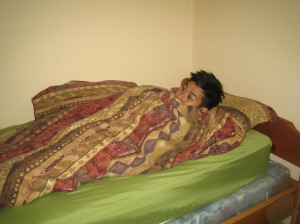Drooling during sleep is also known as sialorrhea is caused by buildup of saliva in the mouth. During daytime, people produce more saliva than during sleep and eliminate it by swallowing. While sleeping, a person cannot swallow as often and will cause the saliva to accumulate inside the mouth and sometimes may flow into the pillow. The best way to avoid waking up with a wet pillow caused by drooling is to incorporate certain lifestyle changes.
What can cause drooling during sleep?
Some people suffer from drooling while sleeping and can affect anyone. The intensity tends to vary from one person to another. Drooling during sleep can be caused by certain conditions such as the following:
- Problems with the sinus or respiratory tract
- Dental conditions such as infection of the teeth and gums
- Taking certain drugs or medications that have side effects that stops the gland from producing saliva
- The anatomy of the person’s mouth such as having a large tongue, tightly arranged teeth and enlarged lymph glands
- Tendency of the person to open the mouth while sleeping
- A dry mouth which stimulates excess production of saliva and can cause it to overflow

It is important to note that drooling during sleep is not a serious problem, unless it is considered as excessive drooling. There are bacteria in the saliva that can cause pneumonia and by inhalation; these can cause the development of lung infections.
Treatment and home remedies for drooling
- Change the sleeping position by sleeping on the back in order to prevent drooling. Sideway sleeping can likely cause the mouth to open, thus causing the individual to drool. Prop the head up or elevate by placing a pillows under the head in order to make the mouth close and have better flow of air.
- While sleeping, breathe through the nose, not via the mouth.
- Treat any allergies or a nasal obstruction that causes a person to sleep with an open mouth. Take note that drooling occurs to those who sleep with an open mouth and this can indicate a respiratory disorder.
- Before going to bed, the individual can smell essential oils such as eucalyptus and rose in order to clear clogged sinuses and relax the body.
- Apply sinus-clearing medications under the nose to help loosen up clogged nostrils.
- Before going to bed, the individual should take a hot and steamy shower so that the vapor from the bath can cleanse the sinuses.
- Seek medical help if the individual is currently taking some medications that causes him/her to drool and generates excessive saliva while sleeping.
- Treat any teeth and gum infections since dental infections can cause excessive production of saliva while sleeping.
- People suffering from sleep apnea experiences unstable flow of air while sleeping. The individual usually gasps for air while sleeping and drooling is one of the symptoms of sleep apnea.
